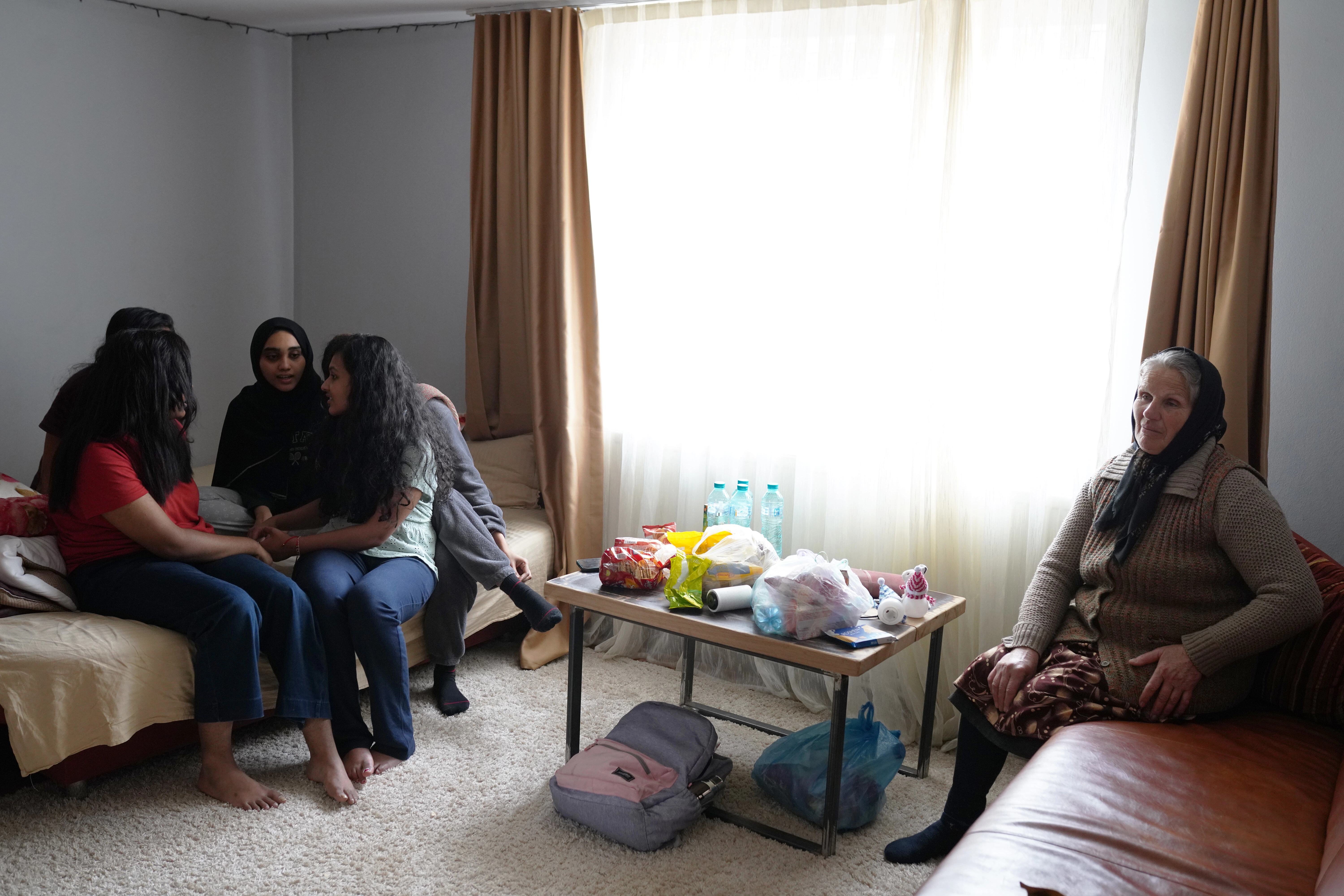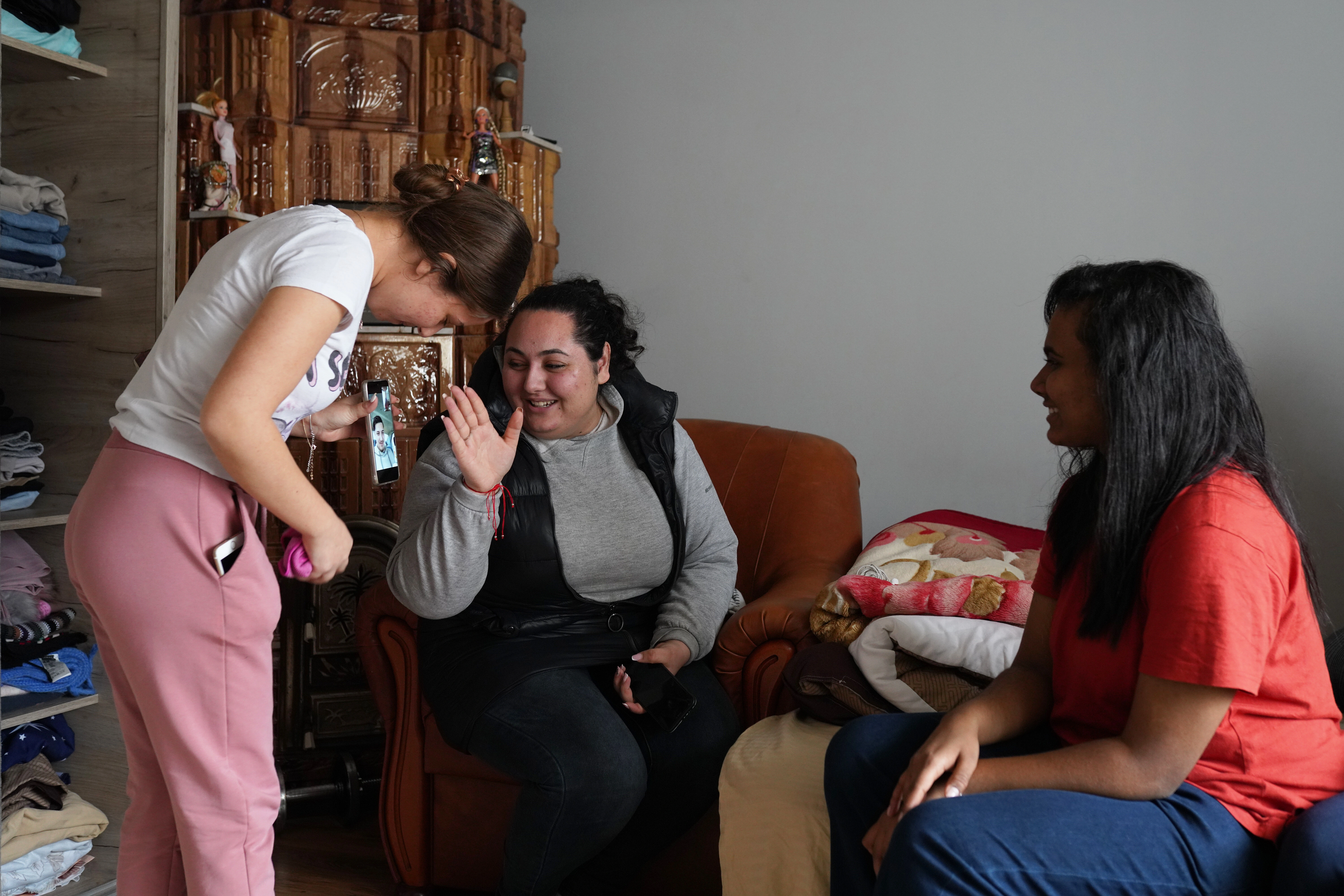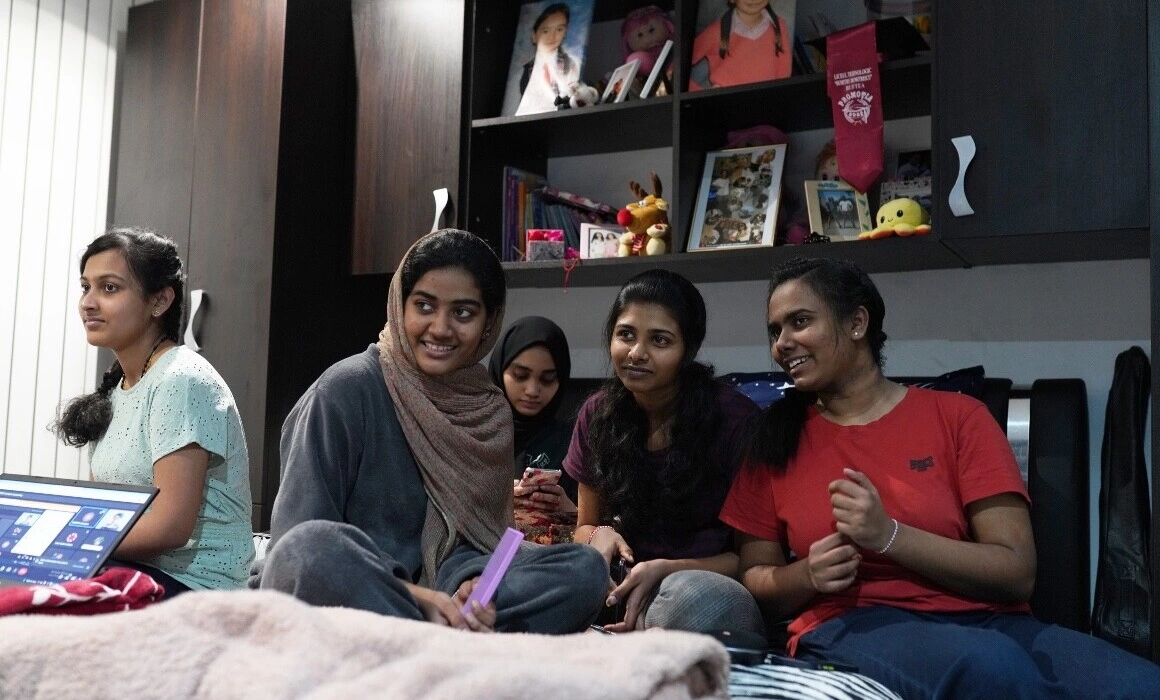Siya, a young woman from southern India, combs her black, wavy hair in a mirror by the side of a bed. Rumana, another young Indian woman, kneels behind her, on the same striped blanket, and begins to braid her hair. “Rumana in Romania. Romania was calling for me,” she jokes, as if the universe brought her here. She entered the country on March 1, the sixth day of the war that started after Russia invaded Ukraine, through the Sighetu Marmatiei customs checkpoint. She is now in Vizurești, a village with just over 1,000 inhabitants in Dâmbovița County, brought over by a war with which she has nothing to do.
It's Friday afternoon and a room of a local family home is hosting five young Indian women who had been studying general medicine at the Bogomolets National Medical University in Kyiv. Four of them - Shifna, Rumana, Swathy, Anaina - are first year students, while Siya is a junior. Their birthplace is Kerala, a state in southern India by the Arabian Sea, a place full of palm trees and coconuts. The first-year girls were living in a shared apartment in Kyiv. They met the third year student on their way to Romania, and now they all seem to be lifelong friends. They fled the Ukrainian capital on February 28, after four days of hiding from bombs in the basement of a hostel where it was cold and dusty, with slop leaking from the showers and toilets through pipes, and dozens of students were sleeping cramped on cardboard or wooden doors.

The room where the Indian students are now feeling at home belongs to Denisa Fofig, the daughter of the deacon of the Vizurești Holy Trinity Pentecostal Church, who is the same age as the young women she’s hosting. She is a Political Science first year student and is in the middle of an online class right now. Her laptop is open on the bed, with the microphone and camera turned off. “It's nice for me to see that they trust us,” Denisa smiles widely, with warm eyes. On her wrist, she’s wearing two bracelets that she received as a sign of thanks from the girls, and around her neck there’s a necklace she received from another group of Indian students whom she hosted before them. In turn, she offered the young women red and white mărțișor strings [trinkets worn to celebrate the beginning of spring on March 1]. “If others come in, we'll take them,” Denisa says.
On Sunday, February 27, 61 Indian students from Ukraine arrived in Vizurești and they have since returned to India. On March 3, 40 other general and veterinary medicine students came and they left today, on March 7. More than 20,000 young Indians were studying in Ukraine. The low cost of studies there (one year of private medicine in India costs about $30,000 / year, whereas in Ukraine it’s about $7,000 / year), the opening to the European job market, and the possibility of obtaining permanent residency are the main reasons for which a large number of Indian students have chosen Ukraine. More than 76,000 foreign students had been studying in Ukraine, and a quarter of them came from African countries such as Nigeria, Morocco, or Egypt.
“We are glad that we can help out somehow,” sighs Aunt Fănica, 65, Denisa's grandmother. The woman is wearing a wool vest over a sweater and a headscarf. She lives alone in a nearby house after the death of her husband two years ago. Grandma brought the girls sugar-rolled donuts made by a neighbor and came in to help Denisa with the cleaning.

Anaina sings an Indian love song about a girl who wants to be close to her partner. The other girls sway on the bed and clap at the end. “Beautiful,” says Grandma Fănica. The students speak to each other in Malayalam, the language of the state of Kerala, and giggle. Two of them have long-distance boyfriends, one in India, the other in Qatar, and they can't wait to see each other again soon.
“Why is she putting on more clothes?”, the grandmother asks Denisa when one of the girls puts on another blouse over her shirt and covers her hair with a scarf to have her picture taken by my colleague.
“Cause she’s not allowed to be seen by other people, just her family.”
“Poor thing…”, Grandma retorts.
Two of the students are Muslim, two are Christian, and one is Hindu. Religious differences don’t matter here. Last night they cooked chicken and vegetables together and before eating they all prayed for peace. “We don't know each other, but there is a connection between us,” Romana says about the relationship between them and the hosts.
The power of the Vizurești community
Differences don’t matter in the Vizurești community at large, either. They all jumped in to help - Roma, Romanians, Pentecostals, Orthodox -, to welcome the Indian students as best they could. They cooked for them, brought them blankets, mattresses, clothes, thick socks, toothbrushes. The boys were housed on mattresses at the Pentecostal Church, while the girls were welcomed into the homes of several families. The previous night, they celebrated three of the students’ birthdays, with cakes and confetti.
By Denisa's gate, a neighbor two villages over pulls up in his car. He greets her with “Peace of God,” the usual Pentecostal greeting, which now seems more relevant than ever. He takes out several bags full of oranges, chicken, and large pickle jars from the trunk.
“You didn't bring zacusca [traditional veggie spread]?,” Denisa asks him. “The girls love it.”
“I didn't,” brother Robert replies regretfully.
The students are sitting barefoot on the tiles in the hall of the house. They’re taking pictures of each other with a bouquet of yellow snowdrops from the garden. Denisa tells them to put on their shoes because it's cold. It's the last bit of cold that the young women will get to experience before they return to their warm land. She will miss the winter and snow in Kyiv, says Siya, a third-year student who is happy to have become more sociable since she left to study in Ukraine. She was much shier in India, she says. She will also miss her Ukrainian professors, with whom she felt as close as she does with her parents.
Yet when they left the country where they lived, they did feel discriminated against. The young women say that, in the subway, people were pushing them and giving them bad looks, as if they weren’t all in the same boat.
Initially, the students did not choose Romania as their transit destination on their way back to India. At the direction of the Indian Embassy, they planned to take the train to Lviv and then to Poland, but they arrived too late and missed it, so, a few hours later, they boarded the train to Rakhiv, in southern Ukraine, close to the Romanian border. After 18 hours of traveling by train, they took a bus to the Romanian border. “I was so tired when I got to the border. Our hands were so frozen that we could barely hold our luggage,” says Rumana. The young women say that the Ukrainian citizens queuing to exit the country had priority. Both the Romanian and foreign press have written about many Indian, African and Roma refugees who have been subjected to discriminatory treatment in an attempt to leave Ukraine.
Shifna, Rumana, Swathy, Anaina and Siya were glad that the Romanians greeted them nicely on the other side of the border and that they fed them. However, the greatest joy was that no one separated them and that they ended up being hosted by the same family. The Șansa Ta association, whose members include Naomi Furdui, a young woman from the village, mediated the students' arrival in Vizurești. Approximately 3,000 Indian students have entered Romania by March 1 and were temporarily housed in Milișăuți, Suceava County, as well as in several towns and villages in Ilfov County: Găneasa, Berceni, Brănești, Snagov, Moara Vlăsiei, Cernica, Otopeni, Buftea, Corbeanca, Voluntari.
*
The living-room of the Fofig house is heated with a terracotta stove whose metal door is decorated with palm trees reminiscent of the state of Kerala, where the students come from. Ana-Maria, Denisa's cousin, tells them about the Romanians' love for Indian films. Boleeee chudiyaaaaan, she says, as she starts singing a famous song, and the girls laugh. She tells them that she has always dreamed of spending her honeymoon in India. A friend videocalls her and greets the girls: “Good morning, girls!” It's the boy who helped them with their luggage when they came in and he’s asking if they want food from McDonald's. They turn him down–they’re going to cook chicken and milk-boiled noodles, Indian-style.

“Do you have coconut milk?” Siya asks.
“There’s no coconut milk in Vizurești,” Denisa laughs.
“It's okay, we’ll make it with cow's milk.”
Siya shows us videos on her phone of food from their country and we can’t help but gulp. Biryani chicken, banana and jackfruit chips and Kanthari moru or Sambharam, a freshly squeezed juice with hot peppers, ginger, curry leaves and lemon, with which they cool down after a hot day. “Ah,” Siya exclaims sharply, and Denisa repeats after her with pathos. “I like to eat with my hands. When we eat with our hands, it is as if we eat with our heart”, the young woman from India says.
Denisa teaches her a few words in Romanian: “cabbage”, “milk”, “noodles with milk” and Siya pronounces them perfectly. “You're a smart girl,” Denisa tells her in Romanian, and Syia repeats it to her. They both laugh.
Brother Robert appears at the gate with several jars of zacusca. “This is the community we were talking about,” says Denisa.
*
The five students left Vizurești this morning, Monday, March 7, at 6AM and are on their way to India. “It was very difficult for me to say goodbye to the girls. There were many tears in the morning. (...) It was God's plan for them to reach our families. Perhaps my heart cries after this goodbye, but now they are my family,” Denisa wrote to me.
My thanks to Ionela Pădure, Magdalena Diaconu, and Naomi Furdui, coordinators of the campaign to host Indian students in Vizurești, for our reception in the community.
Main photo: From left to right, Siya, Shifna, Rumana, Swathy, Anaina
Translated from Romanian by Ioana Pelehatăi




